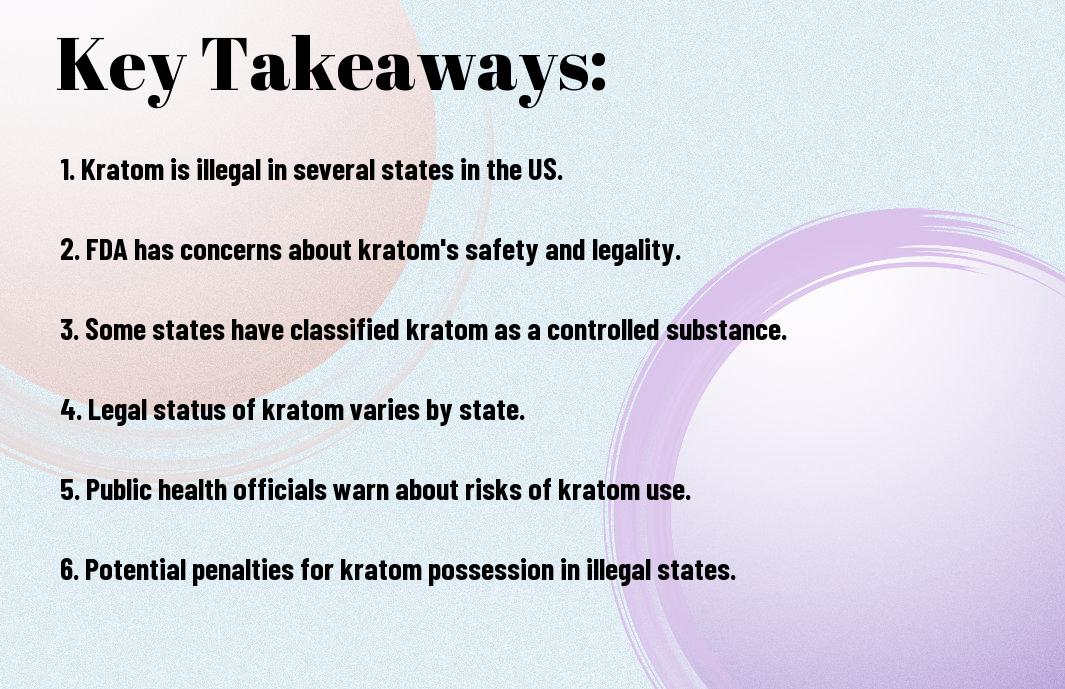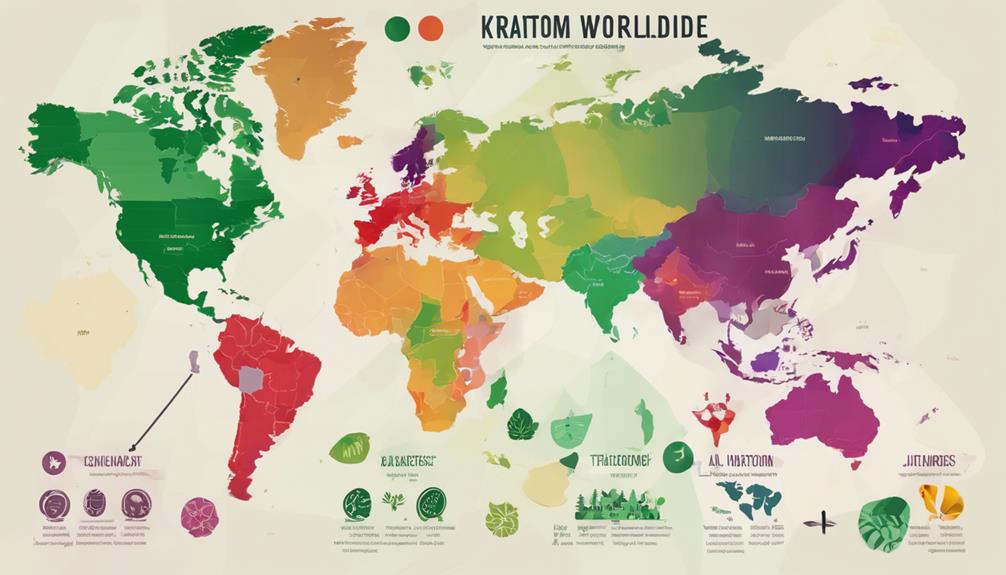Many states have implemented regulations on the use of kratom, a tropical plant often used for medicinal purposes. If you are curious about the legal status of kratom in different states, you can find comprehensive information in the
Kratom Regulation: Federal Status and State Approaches report. Understanding the legal landscape surrounding kratom can help you navigate the laws and regulations in your area.

The Legal Status of Kratom
Federal Law
Legal at the federal level, kratom is classified as a dietary supplement in the United States. As such, it is regulated by the Food and Drug Administration (FDA) under the Dietary Supplement Health and Education Act of 1994. However, the FDA does not approve kratom for any medical use and has issued warnings about its potential risks.
State-by-State Regulations
The legality of kratom varies by state, and some states have specific regulations or outright bans on the substance. It’s important to research the laws in your state before purchasing or using kratom to avoid any legal issues. Some states have imposed age restrictions, while others have banned kratom altogether due to safety concerns.
For instance, in states like Alabama, Arkansas, Indiana, Rhode Island, Vermont, and Wisconsin, kratom is illegal to buy, sell, or possess. It’s crucial to be aware of the regulations in your state to stay compliant with the law.
States Where Kratom is Banned
One state where kratom is banned is Alabama. In Alabama, kratom is classified as a Schedule 1 controlled substance, making its possession, distribution, and consumption illegal. This ban was enacted in 2016, citing concerns about kratom’s potential for abuse and dependency.
Alabama
Banned from public consumption and possession in Alabama, kratom is strictly regulated. The state considers kratom to have no medicinal benefits and views it as a substance that can lead to harmful effects on individuals.
Arkansas
An additional state that has banned kratom is Arkansas. In 2016, Arkansas passed legislation that classified kratom as a Schedule 1 controlled substance, making it illegal to manufacture, sell, or possess kratom within state borders.
Indiana
States like Indiana have also banned the sale and possession of kratom. In Indiana, kratom is classified as a synthetic drug, making it illegal to buy, sell, or possess kratom products.
The state of Indiana considers kratom to have negative health effects and has implemented strict regulations to prevent its availability and use.
Rhode Island
With strict laws in place, Rhode Island prohibits the sale and possession of kratom within its borders. The state views kratom as a substance with potentially harmful side effects and has taken steps to ban its distribution and use.
For instance, the State of Rhode Island’s Department of Health has issued warnings about the dangers of kratom consumption and advises against using kratom products due to safety concerns.
Vermont
Banned in the state of Vermont, kratom is illegal to buy, sell, or possess. Vermont has classified kratom as a regulated drug, citing concerns about its potential for abuse and lack of proven medical benefits.
Kratom is not available for purchase in any form in Vermont, and possessing kratom products may lead to legal consequences.
Wisconsin
Wisconsin is another state that has banned kratom. In Wisconsin, the possession and distribution of kratom are illegal due to concerns about its safety and potential for abuse.
To ensure public safety, Wisconsin has prohibited the sale and possession of kratom products, with penalties for those who violate these regulations.

States with Kratom Restrictions
Unlike the states where kratom is entirely illegal, some states have restrictions on its use. In these states, you may find regulations on the age limit, labeling requirements, or other limitations that govern the sale and distribution of kratom products.
Arizona
Arizona is one of the states that has imposed restrictions on kratom. In this state, kratom is legal for individuals over the age of 18. However, there are strict regulations in place regarding the labeling and packaging of kratom products. It is necessary to adhere to these guidelines to ensure compliance with Arizona’s laws.
Florida
With Florida being one of the states with kratom restrictions, you need to be aware of the regulations in place. In Florida, kratom is legal for individuals over 18 years old. However, certain counties within Florida may have banned the sale and possession of kratom. It is important to research and understand the specific laws in your area regarding kratom use.
It is necessary to stay informed about the latest developments regarding kratom regulations in Florida to ensure that you are compliant with the law. Make sure to check local ordinances and regulations to avoid any potential legal issues related to kratom use.
Illinois
Any discussion about states with kratom restrictions must include Illinois. In Illinois, kratom is legal for individuals over 18, but certain cities within the state have banned kratom. These local ordinances supersede state law, so it’s crucial to be aware of the regulations in your specific area.
Florida is one of the states with a patchwork of regulations when it comes to kratom. Be sure to research and understand the laws in your city or county to ensure that you are abiding by all relevant regulations regarding kratom use.
New Hampshire
On the list of states with kratom restrictions is New Hampshire. In New Hampshire, kratom is legal for individuals over 18 years old. However, there are specific regulations in place regarding the sale and distribution of kratom products. It is important to understand and follow these regulations to avoid any legal complications.
Plus, make sure to stay informed about any updates or changes to the laws governing kratom in New Hampshire. Keeping up-to-date on the regulations will help you navigate the legal landscape surrounding kratom in the state effectively.
Tennessee
Florida is one of the states with kratom restrictions, and Tennessee is another state where kratom use is regulated. In Tennessee, kratom is legal for individuals over 21 years old. However, certain municipalities in Tennessee have banned the sale and possession of kratom. It’s necessary to be aware of the specific laws and regulations in your area regarding kratom.
States like Florida and Tennessee have varying degrees of kratom regulations, so it’s crucial to be well-informed about the specific laws in your state and local area to ensure that you are compliant and avoid any legal trouble related to kratom use.
Reasons Behind Kratom Prohibition
Health Concerns
Not all states have banned kratom without reason. Health concerns are one of the primary reasons cited for the prohibition of kratom. Critics argue that kratom can have adverse effects on your health, including potential liver damage, seizures, and even death in extreme cases. These risks have led some states to err on the side of caution and outlaw the substance.
Addiction Risks
Kratom’s potential for addiction is another factor contributing to its prohibition in certain states. The substance interacts with the brain’s opioid receptors, leading to a risk of dependency. People can develop a tolerance to kratom, requiring larger doses over time to achieve the same effects. This addictive nature has raised red flags among lawmakers and health officials, prompting them to take action to protect the public from potential harms.
Understanding the addictive properties of kratom is crucial in grasping why some states have chosen to ban it. The substance’s similarities to opioids in terms of addiction potential make it a cause for concern, especially as misuse and abuse rates continue to rise.
Lack of Regulation
Behind the kratom prohibition in certain states lies the lack of regulation surrounding the substance. Unlike pharmaceutical drugs, kratom is not subject to the same rigorous testing and oversight by regulatory bodies. This lack of quality control and standardization has led to varying potency levels and potential contamination in kratom products, posing significant health risks to consumers.
With the absence of reliable information on kratom’s sourcing and production methods, concerns about its safety and purity have fueled calls for stricter regulations or outright bans on the substance in some states.
Law Enforcement Concerns
Kratom’s legality is also influenced by law enforcement concerns. While some advocates argue for the potential benefits of kratom, law enforcement officials often focus on its association with substance abuse and the potential for criminal activities linked to its distribution. The lack of clarity on kratom’s legal status and its potential for misuse have prompted law enforcement agencies to take decisive action against the substance.
Reasons behind kratom prohibition are multifaceted, encompassing health risks, addiction concerns, regulatory gaps, and law enforcement perspectives. Understanding these various factors can shed light on why some states have chosen to outlaw kratom to protect public health and safety.
Impact of Kratom Prohibition
On Users
An outright ban on kratom can have significant impacts on users like yourself. Kratom is often used by individuals to manage chronic pain, anxiety, and even as a substitute for opioids. If kratom is made illegal in your state, you may find yourself without access to a herbal remedy that you rely on for various health reasons. This can lead to withdrawal symptoms, increased pain levels, and feelings of distress.
On Businesses
To businesses that sell kratom products, a prohibition can have devastating consequences. Many small businesses rely on the sale of kratom to sustain their operations. With a ban in place, these businesses may face closure, leading to job losses and financial instability. Additionally, suppliers and farmers who cultivate kratom may also suffer economic hardships due to the sudden decline in demand for their product.
Understanding the impact of a kratom ban on businesses is crucial. Not only does it affect the livelihoods of those directly involved in the kratom industry, but it also has broader economic implications. The loss of jobs and tax revenue from kratom sales can have a ripple effect on the local economy, leading to a decrease in overall economic growth and stability.
On the Economy
Users like yourself contribute significantly to the economy through the purchase of kratom products. A ban on kratom could lead to a shift in consumer spending habits, affecting the revenue of businesses that sell kratom-related products. This, in turn, can impact the overall economy at both a local and national level, as businesses struggle to adapt to the changes in market demand.
Kratom prohibition not only affects individual users and businesses but also has broader economic consequences. It is crucial to consider the far-reaching effects of kratom bans on the economy and take into account the various stakeholders involved in the kratom industry.
Efforts to Legalize Kratom
Advocacy Groups
For advocacy groups in support of Kratom, the focus is on educating the public and lawmakers about the benefits of this plant. These groups work to dispel myths and misinformation surrounding Kratom, emphasizing its potential for natural pain relief and its role in helping individuals struggling with opioid addiction.
Lobbying Efforts
One way advocacy groups seek to change laws is through lobbying efforts. Lobbyists work to meet with lawmakers, present scientific evidence, and advocate for the decriminalization or legalization of Kratom. They aim to influence policy decisions by providing accurate information and promoting the potential positive impact of Kratom on public health.
An effective lobbying strategy involves building relationships with key decision-makers, conducting grassroots campaigns to mobilize public support, and collaborating with legislators to draft bills that propose regulatory frameworks for Kratom.
Proposed Legislation
Legalize Kratom
Proposed legislation to legalize Kratom often includes provisions for quality control, labeling requirements, age restrictions, and dosage guidelines. By regulating the production and sale of Kratom products, lawmakers aim to ensure consumer safety while still allowing access to this natural remedy.
Final Words
Hence, it is crucial to be aware of the legal status of kratom in your state to avoid any legal consequences. If you reside in one of the states where kratom is illegal, make sure to refrain from possessing or using this substance. It’s always advisable to stay informed about current regulations and laws regarding kratom to ensure compliance and avoid any potential legal issues.
Q: In which states is kratom illegal?
A: Kratom is currently illegal in Alabama, Arkansas, Indiana, Rhode Island, Vermont, and Wisconsin.
Q: Why is kratom illegal in these states?
A: Different states have varying reasons for banning kratom, including concerns about its potential for abuse and dependence, lack of regulation, and potential health risks.
Q: Can kratom legality change in these states?
A: Yes, kratom legality can change in these states through legislative action, advocacy efforts, or new research that may influence the decision to ban or regulate kratom.
Q: Are there any pending bills to legalize kratom in these states?
A: There may be advocacy efforts and pending bills in some states to legalize or regulate kratom, but the status can vary. It is advisable to stay informed through local news sources and advocacy groups.
Q: Can kratom be shipped to or possessed in these states legally?
A: It is illegal to ship or possess kratom in states where it is banned. Doing so could result in legal consequences, including fines or imprisonment.
Q: Are there any exemptions for medical use of kratom in banned states?
A: In some states, there may be limited exemptions for medical use of kratom under certain circumstances. However, it is crucial to consult with legal experts or advocacy groups for accurate information.
Q: How can I support efforts to legalize kratom in banned states?
A: You can support efforts to legalize kratom in banned states by staying informed, joining advocacy groups, contacting lawmakers, sharing your personal experiences, and raising awareness about the potential benefits of kratom when used responsibly.










